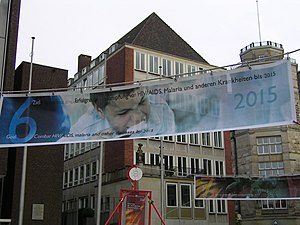 Image via Wikipedia
Image via WikipediaResearchers and scientists have come up with ideas and technologies to make sustainable development through sustainable use of resources possible. But, an absence of collaboration with planners and policymakers has been a major roadblock to addressing problems including poverty, hunger, mounting food insecurity, poor agriculture performance, inefficient irrigation and water use, climate change, environmental degradation, inadequate environmental sanitation, joblessness and health crises.
Nadeem Ul Haque, deputy chairman of the Planning Commission of Pakistan says there is a need for people to work together to come up with an actionable and creative agenda for socio-economic growth of in all South Asia, and ways to make the development more durable.
"Shifting (the) focus of federal policies of the regional governments from mere political agendas to science, research and technological advancement is critical for sustainable development," added Abid Qaiyum Suleri, executive director of the Islamabad-based Sustainable Development Policy Institute, at the 14th South Asia Sustainable Development Conference in December last year in Islamabad.
Policymakers and planners must be able to effectively access research to fight the problems facing the region, where nearly 600 million of the world’s poor live, speakers at the conference said.
Peter Taylor, a programme specialist at Canada’s International Development Research Centre, remarked that while policymakers’ need access to quality, objective information generated through independent research, it is also crucial research addresses the concerns of the region’s governments.
"Such collaboration gaps must be plugged by the governments themselves (in an effort) to develop and implement policies … that would help lead to more equitable, prosperous societies," he said.
In many cases, technological advances in the region have hardly reached the majority of people who need them. There are various reasons behind this problem, but lack of collaboration among policymakers, researchers and government policymakers is near the top.
TECHNOLOGY NOT REACHING POOR
Eak Bahadur Rana Magar, project coordinator at the International Centre for Integrated Mountain Development (ICIMOD), said that the benefits of technology and access to technology have not reached a huge number of the region’s poor. Largely that is because market pressures and the needs of developed countries, rather than those of poor countries, influence technology development and dissemination.
Besides improving technology access and research, ensuring adequate preparation to tackle climate change effects, meeting the Millennium Development Goals (MDGs) and ensuring pro-poor governance are key to providing a comfortable living and food security for South Asia’s 600 million poor.
Bipul Chatterjee, executive director at the Consumer Unity & Trust Society (CUTS) International, India, believes that food insecurity and livelihood threats are further intensified by the impacts of climate change in South Asia. A well-thought-out plan to mitigate climate change effects on all socio-economic sectors is need of the hour, he says.
Lack of such a plan “will only deepen the miseries of all of us, particularly of the marginalised and the deprived,” he said. Efforts to adopt climate change-resilience initiatives and low-carbon economic development efforts to reduce climate change also are key, or the region may face large-scale impacts, such as the recent devastating flooding in Pakistan, he said.
Chatterjee said that over the last several years India has made great strides in key areas of science and technology, including water conservation, renewable energy and high-yield crops, and that such advances should be shared with the region.
"These technologies and relevant scientific and technological know-how can be transferred to other regional countries if better collaborative science and technology policies are implemented," he said.
Source : trust.org
Source : trust.org










